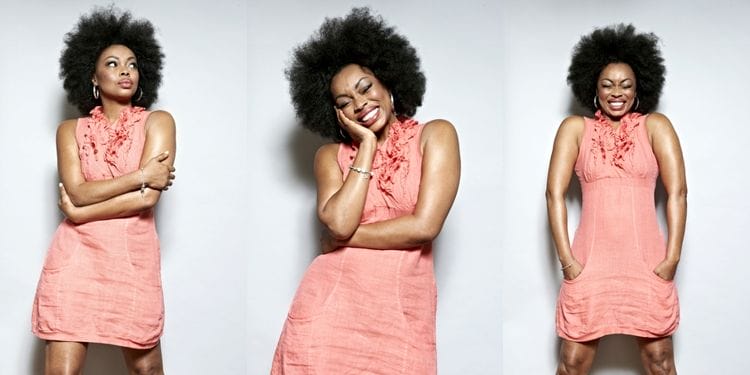Following highly successful runs at the Edinburgh Fringe 2016, International Slavery Museum Liverpool, and The Wardrobe Theatre in Bristol, Identity Crisis by Phina Oruche transfers to London’s Ovalhouse next week. We caught up with Phina to find out how a tragedy inspired a one-woman comedy.
You’re bringing Identity Crisis to Ovalhouse, what can you tell us about the show?
Identity Crisis focuses on nine characters all of whom are having their own identity crises; they are black, white, old, young, male and female. The nine characters include Sir Bobby Blue, director of a large 62 media establishment; Rasta, a street emperor in his 30’s; Mama Nukku – a flamboyant 70-year-old religious woman who has had to fight for everyone, especially her daughter; Amy Tan, a working class white girl aged 18 who is image-obsessed with scouse brows, massive lashes and a spray tan; Mary the middleclass white widow who’s relied on her husband her whole life and now has to cope alone; and another named Antonio de Silva, who is a greasy haired gorgeous 29 Italian immigrant. I had a ball playing these people!
What inspired you to write the show?
For me the play is about dealing with loss. The loss of my niece, who died aged 19 in my home from a brain aneurysm unexpectedly, the survivor’s guilt that accompanied the loss of my mind through grieving for my niece, and the loss of my position through objecting about the segregated radio stations that I was working on at the time. I was also stalked and robbed and the man – a white confidence trickster who specialises in intellectual fraud – was later jailed. Also, my marriage was failing so I was done. I was lower than I have ever been and I needed a life raft.
Why did you want to make it a comedy when it was inspired by such tragic circumstances both in your life and in work?
The bible says, “laughter does you good like medicine,” and one of my favourite things about being a Scouser is that we laugh through the hardest times. Plus, it was a real teachable moment for me, It was me saying ‘this is what it can be like to be black sometimes’, and I didn’t want to alienate the audience, I had made some real life blunders about racism, tackled it so poorly because I was grieving and was too hard on the subjects so they just shied away, and hid form me. I didn’t want to make that mistake again. Instead, here I wanted people to understand that I am saying how can we all heal from these things that we inflict on one another.
You’ve already performed it in Liverpool, Bristol and at Edinburgh Fringe, what did you learn from those productions?
I did loads of regional nights funded by the generosity of the arts council, so I knew immediately based on the places that I had taken my show, that these common working class stock, many of who are not traditional theatre goers do not pull punches, and when I started to get the feedback on the forms and that it resonated with all ages, all creeds all colours I knew I was onto something. I am grateful because I was losing hope in the racial question. I did a lot of the writing on my feet in the character too. I believe I have the oral tradition that many Africans had passed on. I think you get more from people when you tell them a story if you can make them laugh. I also think that being a Scouser and having that madcap sensibility was part and parcel also a different voice. I learnt that we are more than the summary of our DNA, we are more than the culture we have adopted or adapted to, that we are the sum of our collective parts and that there is more that unites us than the things people use to separate us, and finally that for me, I got my identity fixed in God, my creator, because when as else failed it was all I had.
Do you have a favourite character from Identity Crisis?
Mama Nukku (which means Grandmother) is the one that gets all the hits, now she is raw, hysterical and heavily drawn on my own mother and the tough Scouse mothers that I see around me…who I am turning into daily! Mama Nukku is the naughty one who is too long in the tooth to sugar coat it. I have that in common with her and It causes me equal parts empowerment and distress. It also gets me into a lot of trouble.
What’s most exciting (or challenging) about performing a one-woman show?
The buck stops with ‘you’. It’s all on you. You wrote it, you’re raising money for it, you will be praised if it goes well, you will be slaughtered if it doesn’t. I like the creative ski jump element… can I pull it off! Artistically its heave. Plus, I have been home minding the baby for seven years, so I had to play all the characters I had missed during that time.

















